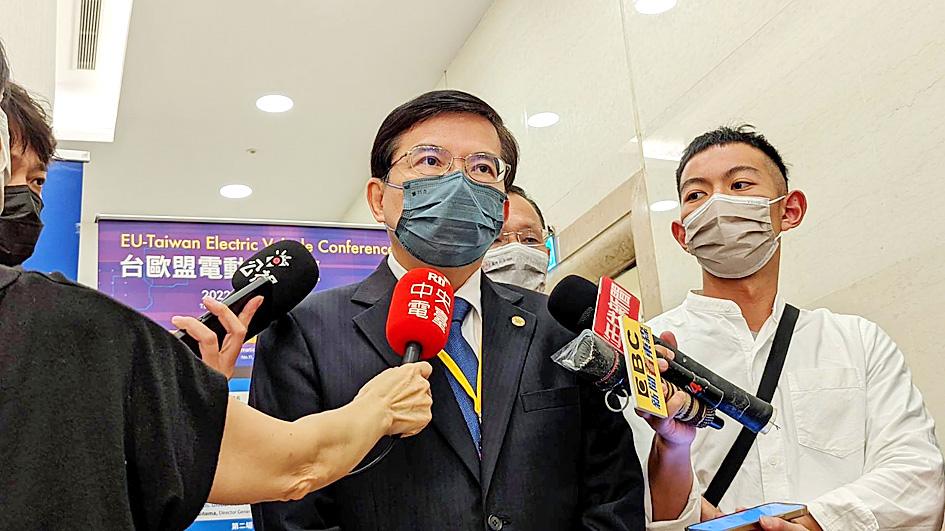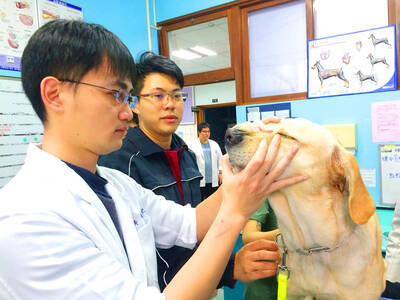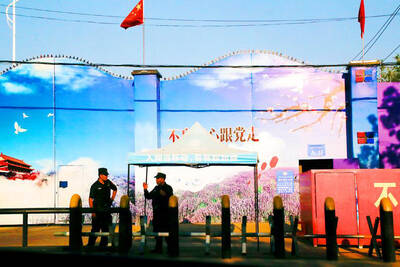The government is not likely to raise the cap on the number of inbound travelers before the end of this month, despite the apparent effect on the number of inbound flights, Minister of Transportation and Communications Wang Kwo-tsai (王國材) said yesterday.
The Central Epidemic Command Center (CECC) on Wednesday last week eased quarantine rules for inbound travelers, who must undergo three days of home quarantine upon arrival and spend another four days in self-initiated disease prevention.
It also capped the number of inbound travelers to 25,000 per week.

Photo: Cheng Wei-chi, Taipei Times
The weekly limit has drawn criticism that it has limited the number of flights to Taiwan and caused ticket prices to skyrocket. The shortage of inbound flights is expected to worsen, as the nation is soon to enter the summer travel season.
Wang told reporters on the sidelines of the EU-Taiwan Electric Vehicle Conference that the ministry had tried to address the matters at interdepartmental disease prevention meetings.
“Currently, only three groups of people are allowed to enter the country: business travelers, migrant workers and Taiwanese nationals as well as Alien Resident Certificate holders,” Wang said. “The cap on inbound travelers would be kept at 25,000 people per week until the end of the month, considering the nation’s medical capacity.”
“Any change in this policy would be contingent upon the COVID-19 pandemic situation and whether the nation’s healthcare system can cope with a potential surge in the number of positive cases, and the CECC is in charge of these matters,” he said.
Wang also said that it would be difficult for the government to control the rising prices of international flight tickets.
“The demand for international flights outweighs the supply. We hope this is only a short-term phenomenon,” he said.
Centers for Disease Control Deputy Director-General Philip Lo (羅一鈞), who is also the deputy head of the CECC’s medical response division, yesterday said that the nation has only recently eased the quarantine requirements for inbound travelers.
“We are examining whether people are complying with the new regulations, which allow people to leave their residences after completing a three-day quarantine only if they test negative with rapid test kits on the fourth day,” Lo said.
Lo also said on Monday that the center does not plan to increase the cap on inbound travelers this week, but would ask the Civil Aeronautics Administration and the Tourism Bureau to evaluate the number of flights that would be needed, as well as the availability of quarantine hotels and quarantine taxis.
In other news, Wang told participants of the electric vehicle conference that Taiwan plans to boost the number of charging stations nationwide through government subsidies, particularly those at public facilities.
The National Development Council earlier this year announced the pathway to achieving net zero carbon emission by 2050.
To reach that goal, the ministry will ensure that all cars and motorcycles sold on the market are powered by electricity by 2040, Wang said.
Buses should be fully electrified by 2030, he said.
So far, the nation has only about 2,000 charging stations and electric buses only account for about 8.2 percent of the buses nationwide, he said.
The government would have charging stations installed at important transport hubs, such as freeway rest areas, hotels, parking spaces, and railway and bus stations, Wang said, adding that motorists would be able to learn the locations of charging stations through an app.

Former Czech Republic-based Taiwanese researcher Cheng Yu-chin (鄭宇欽) has been sentenced to seven years in prison on espionage-related charges, China’s Ministry of State Security announced yesterday. China said Cheng was a spy for Taiwan who “masqueraded as a professor” and that he was previously an assistant to former Cabinet secretary-general Cho Jung-tai (卓榮泰). President-elect William Lai (賴清德) on Wednesday last week announced Cho would be his premier when Lai is inaugurated next month. Today is China’s “National Security Education Day.” The Chinese ministry yesterday released a video online showing arrests over the past 10 years of people alleged to be

THE HAWAII FACTOR: While a 1965 opinion said an attack on Hawaii would not trigger Article 5, the text of the treaty suggests the state is covered, the report says NATO could be drawn into a conflict in the Taiwan Strait if Chinese forces attacked the US mainland or Hawaii, a NATO Defense College report published on Monday says. The report, written by James Lee, an assistant research fellow at Academia Sinica’s Institute of European and American Studies, states that under certain conditions a Taiwan contingency could trigger Article 5 of NATO, under which an attack against any member of the alliance is considered an attack against all members, necessitating a response. Article 6 of the North Atlantic Treaty specifies that an armed attack in the territory of any member in Europe,

LIKE FAMILY: People now treat dogs and cats as family members. They receive the same medical treatments and tests as humans do, a veterinary association official said The number of pet dogs and cats in Taiwan has officially outnumbered the number of human newborns last year, data from the Ministry of Agriculture’s pet registration information system showed. As of last year, Taiwan had 94,544 registered pet dogs and 137,652 pet cats, the data showed. By contrast, 135,571 babies were born last year. Demand for medical care for pet animals has also risen. As of Feb. 29, there were 5,773 veterinarians in Taiwan, 3,993 of whom were for pet animals, statistics from the Animal and Plant Health Inspection Agency showed. In 2022, the nation had 3,077 pediatricians. As of last

XINJIANG: Officials are conducting a report into amending an existing law or to enact a special law to prohibit goods using forced labor Taiwan is mulling an amendment prohibiting the importation of goods using forced labor, similar to the Uyghur Forced Labor Prevention Act (UFLPA) passed by the US Congress in 2021 that imposed limits on goods produced using forced labor in China’s Xinjiang region. A government official who wished to remain anonymous said yesterday that as the US customs law explicitly prohibits the importation of goods made using forced labor, in 2021 it passed the specialized UFLPA to limit the importation of cotton and other goods from China’s Xinjiang Uyghur region. Taiwan does not have the legal basis to prohibit the importation of goods